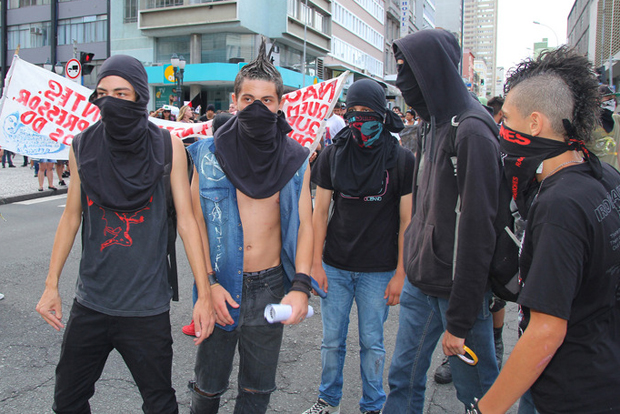
In Curitiba, about 300 protesters took to the streets of the central city asking for more health and safety improvements in the country and against the hosting of the World Cup 2014 in Brazil. (Image: João Frigério / Demotix)
On 8 January, residents in Rio’s Metrô-Mangueira favela, were greeted by government representatives, set to demolish houses and evict residents. A demonstration was led then by the residents to fight their removal, but once again violence broke out between the police and the protestors, with police firing rubber bullets into crowds.
Rio On Watch said: “Having evicted long-time residents to public housing units without any public consultation over the use of land – required by local legislation – the city left the land and houses to be occupied by those in most desperate need of public housing.” These “desperate” residents are now being forced out and given no alternative housing, despite promises from mayor Eduardo Paes that nobody would be left homeless.
The demonstration in the Metrô favela, is emblematic of the current mood all across Brazil. Triggered by a hike in already expensive bus fares, 2013 saw Brazil’s biggest protest movement for over 20 years, in what became known as the “V for Vinegar” movement or the “Salad Revolution”. More than two million protestors took to the streets to fight against issues such as government corruption, poor social services and a rise in the cost of living. Right at the heart of the movement however, was a feeling of alienation and exclusion from the decision making process for the preparations of the 2014 World Cup.
According to the United Nations Human Rights Council, in the context of the implementation of sporting mega events, all UN states must, “ensure full transparency of the planning and implementation process and the meaningful participation of the affected local communities therein”. However this transparency is not happening in Brazil as authorities bulldoze favelas, and replace them with car parks and shopping centres.
A report by the National Coalition of Local Committees for a People’s World Cup and Olympics said: “Supported by a twisted notion of ‘public interest’, the Brazilian state has systematically refused to establish horizontal dialogues with civil society groups and threatened communities.”
In many cases residents learn of their evictions through the media before government communications. This was true for the residents of Vila Autódromo in Rio, who first learned of their proposed eviction through the front page of the O Globo newspaper on 4 October 2011.
In other cases, residents are told by authorities that their properties must be demolished because of alleged structural risks. Three hundred homes were identified for demolition because of such “structural risks” in Pavão-Pavãozinho, but residents have been waiting since July 2011 for authorities to provide evidence of such risks. This is a further example of the Brazilian government failing to offer their citizens information or ensure political transparency.
The government has established two bodies to organise the World Cup, which exist outside the normal political structure. The 2014 World Cup Steering Committee and the Committee Responsible for Host Cities liaise with FIFA, the federal government and advisory bodies mostly comprised of private companies. Decisions made by these bodies are not discussed with the public, and information regarding plans is excluded from the general population.
In Curitiba, the population unanimously opposed the council’s decision to give £22.5m to the private construction of the João Américo Guimarães Stadium. However requests for information were denied and there was no public participation in the council’s decision.
The example of the João Américo Guimarães Stadium, is typical of the wider situation whereby the government is spending billions of dollars on the construction of infrastructure and stadiums without giving the people a say in the matter. The Arena da Amazônia stadium in Manaus has cost £151m, while The Economist estimates that the Brazilian government has already spent £1.9 billion on World Cup stadiums collectively.
Marcelo Pelligrini, a journalist from São Paulo told Index on Censorship: “This is a huge stadium [Arena da Amazônia] because of the standards of FIFA, but after the World Cup we have no use for this stadium, and after the tournament it will probably become a jail.”
“The main point in Brazil is the use of these millionaire stadiums. That is what the population is complaining about. They are spending half a billion reias on a stadium that has no use after the World Cup, and we have no good transportation, no health insurance, we have nothing,” Mr Pelligrini said.
The World Cup is not benefiting the Brazilian people, according to Pelligrini: “We have great stadiums, but no good services.” He also felt that the Brazilian people were not being given democratic representation in the decision making process.
Denied a say in the preparations for the World Cup, the Brazilian people flocked to the streets in 2013, to protest against the way the government has been organising the tournament. The protests were driven by a multitude of building grievances, but a feeling that the democratic process had broken down, and the voice of the Brazilian people was being ignored, was at the heart of the demonstrations. Protestors held banners proclaiming, “FIFA go home”, “We don’t need the World Cup, we need money for hospitals and education” and “World Cup for whom?”
These sentiments epitomise the zeitgeist of the Brazilian nation, and their feeling that the World Cup has only benefited the few, while he vast majority are excluded from the decisions and thus the benefits.
The recent protest in the Metrô-Mangueira favela underlines how these grievances are ongoing. The image of residents clashing once more with riot police depicts the ultimate breakdown in communications and democracy in the lead-up to the biggest, and supposedly most unifying, football tournament in the world.
This article was posted on February 10 2014 at indexoncensorship.org





